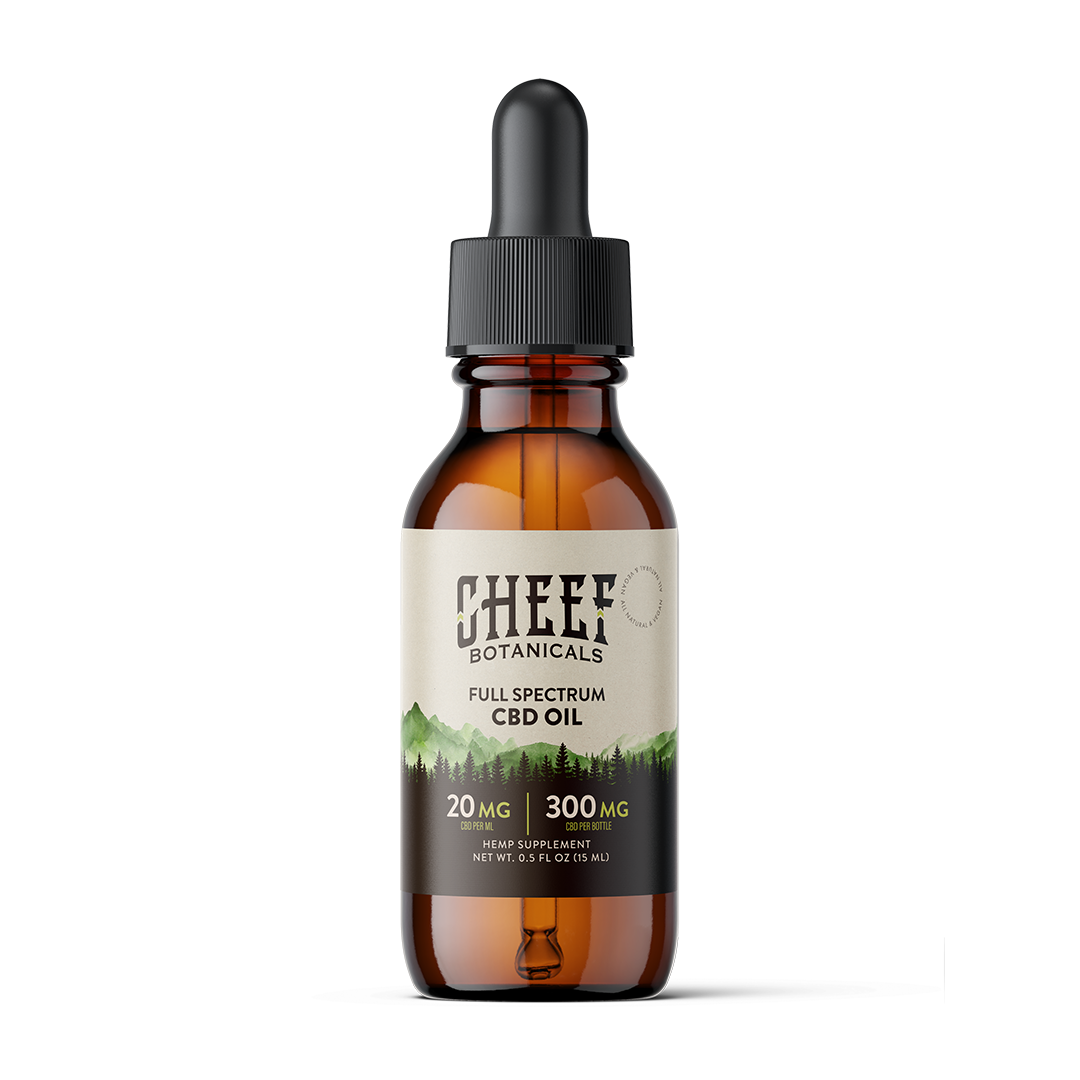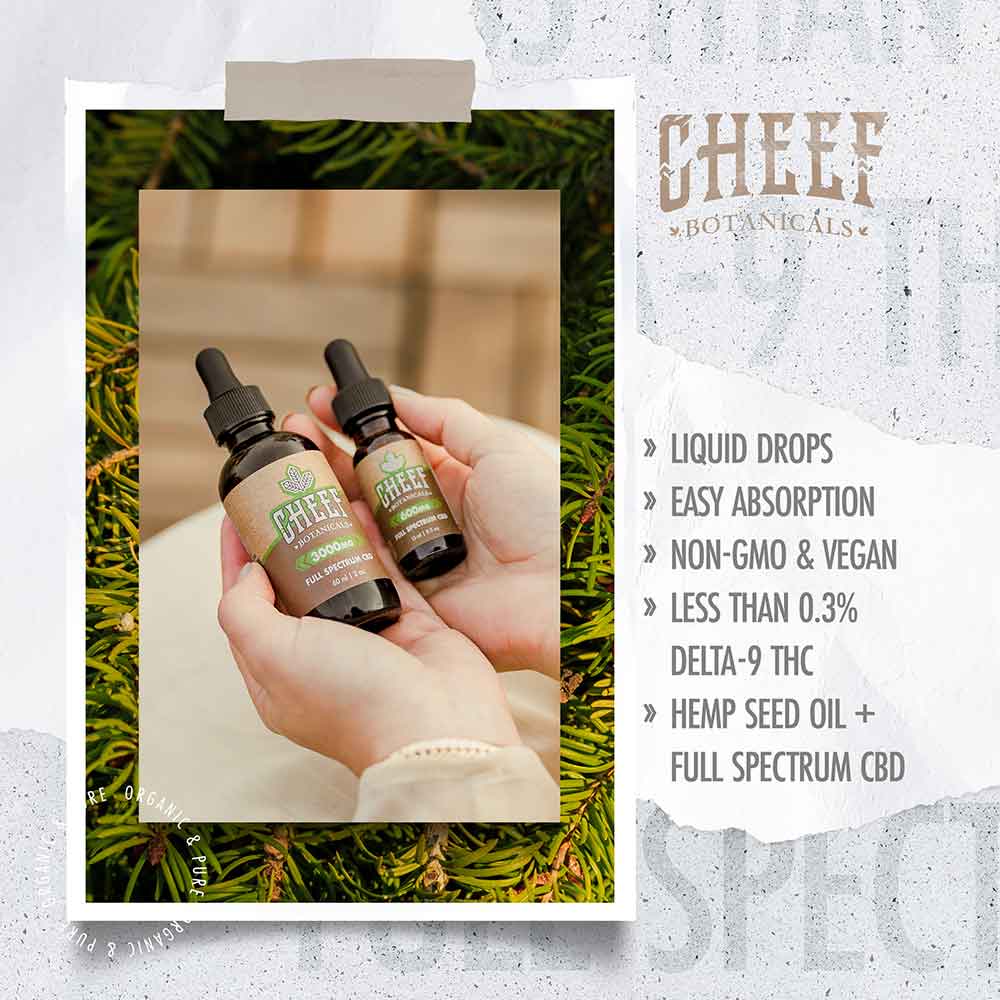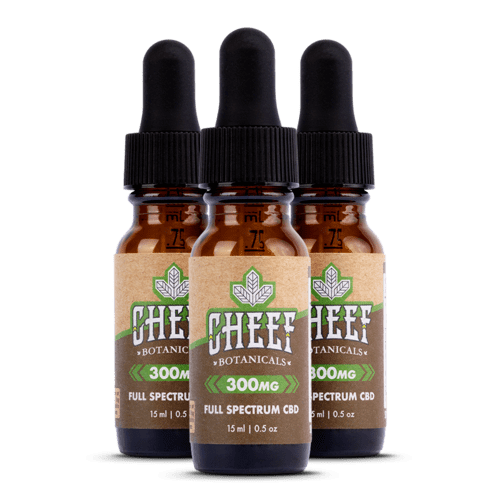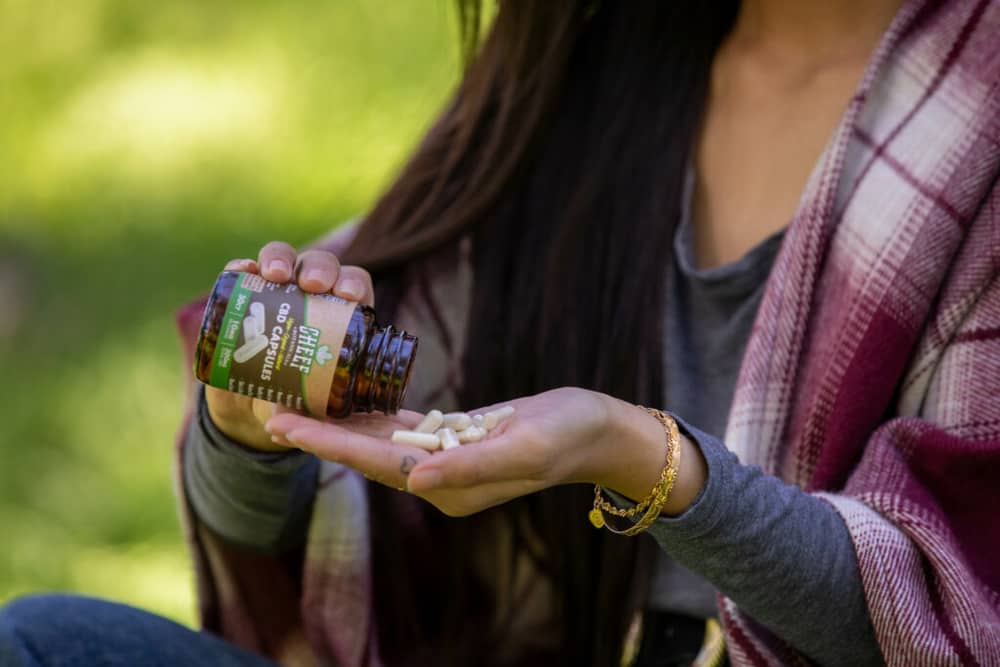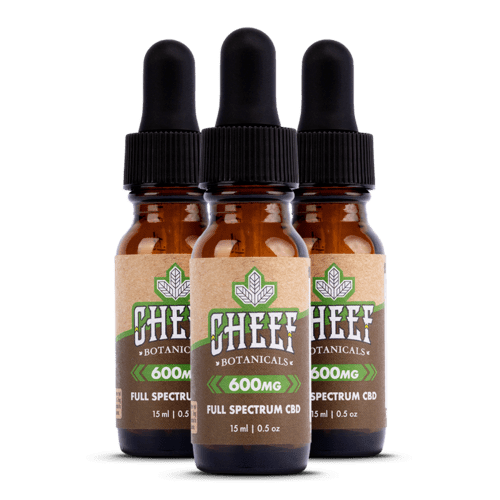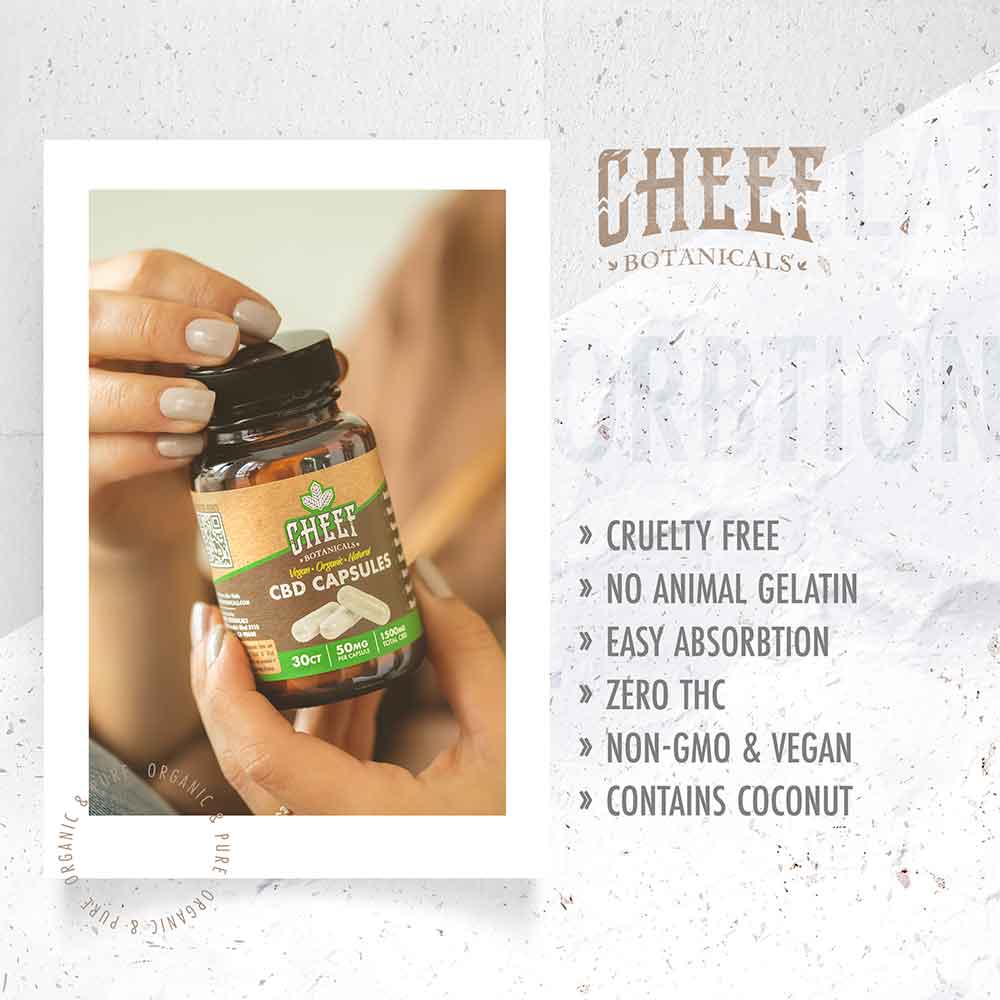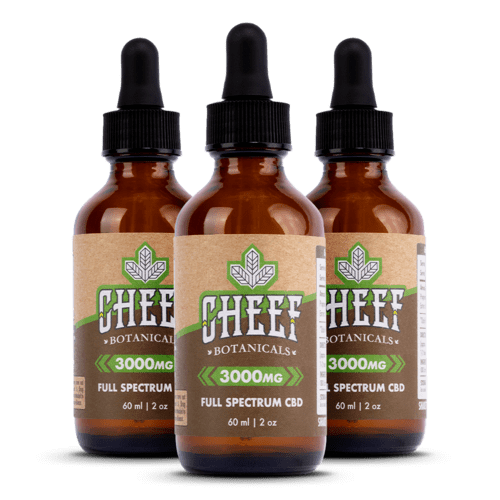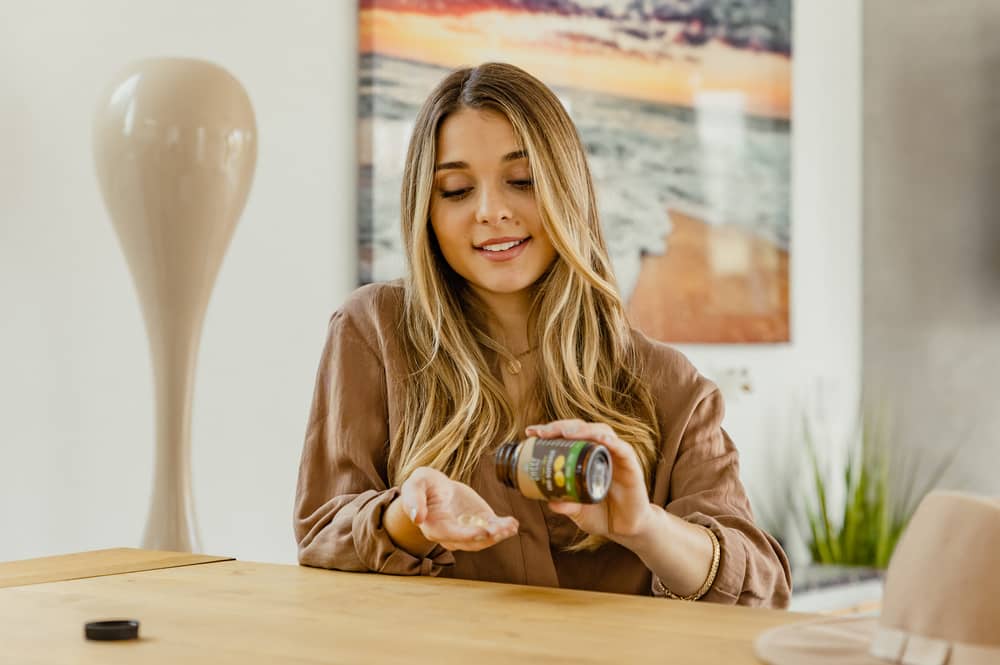You keep hearing about CBD oil and see it for sale, you have an idea of what it is but don’t really know the details. Sound familiar? If so, don’t worry. By the time you are finished reading this content, we promise you will know just what to look for when buying CBD oil (tincture).
Read More
We will learn the difference between full spectrum CBD hemp oil, broad spectrum CBD oil, and CBD isolate. Plus we will see how to determine your correct dosage, if there are any risks of potential side effects, and much more!

What is CBD Tincture?
Before you buy CBD oil, also referred to as "CBD tincture," you should have a general understanding of what it is. Cannabidiol (CBD) is one of many natural cannabis derived compounds found in agricultural hemp plants. There are over a hundred cannabinoids that can be found in hemp, with THC and CBD being the most researched and popular. Each of these offers many benefits, but the main difference is that CBD is beneficial and does not cause intoxication.
Read More
CBD is not to be confused with THC. THC (tetrahydrocannabinol) is the main cannabinoid found in cannabis plants. THC is known for its psychoactive properties. In other words, THC will get you “high,” but CBD will not. Plus, CBD can promote a healthy lifestyle and a state of balance in the body.
This is what makes CBD oil so unique and a desirable product for sale. Many people buy CBD oils because they do not like the adverse effects of THC. THC can affect the mind and hinder their daily functioning. However, with CBD tinctures, there is no need to worry about that. It will allow you to carry out your daily tasks as you normally do.
Taking cannabidiol (CBD) from hemp is the best way to reap the scientifically proven advantages. Cheef Botanicals offers quality CBD tinctures, aka CBD oils, that are well-known for their upstanding development process and effectiveness among consumers. Our hemp-derived products are legal to be shipped to all 50 states across the country.
Are All CBD Oils Legal?
CBD products are legal, thanks to the 2018 Farm Bill! However, it's important to note the exact legal status that requires any hemp-derived or CBD product to only contain up to 0.3% THC to comply with the rules set by the federal government. To avoid any legal issues, it's important that you buy your CBD oil from ethical, trusted, and reputable brands like Cheef Botanicals!
Even though all our products are made from hemp and NOT marijuana, it never hurts to check your state's CBD laws to ensure there are no restrictions. Any product with over 0.3% THC is labeled a marijuana product and will need to comply with your state's medical marijuana laws.
How Is CBD Tinctures Made?
Making CBD oil is a two-step process. First, cannabidiol (CBD) is extracted from the cannabis plant (hemp flower) and, to a lesser extent, the leaves and stalks of the plant. The second step of making CBD oil involves taking the hemp extract and combining it with a carrier oil, like hemp seed oil. This dilutes the final product to make different potencies of CBD oil.
Although we outlined the basic process of making CBD oil, various methods exist to obtain CBD. Let’s take a closer look at the different CBD extraction methods.
Supercritical CO2 Extraction
Supercritical CO2 extraction is the best method for extracting CBD. Although expensive, this method produces premium CBD-rich extracts. This extraction method requires expensive and advanced equipment and is extremely safe and clean to use. That is why only industry-leading brands with top-shelf CBD, like us at Cheef Botanicals, employ this method.
Supercritical CO2 extraction involves pressurizing CO2 gas at low temperatures. This converts the gas into a liquid that dissolves the CBD-rich trichomes of a cannabis plant (crystalline outgrowths on cannabis flower) to produce CBD extract. Once obtained, the temperature and pressure are reverted to normal levels, causing the CO2 to return to its gaseous state. The result is a solventless distillate of more than 90% pure CBD.
CBD Capsules
CBD soft gels are a convenient, easy, discreet, and cruelty-free way to consume CBD. Our vegan, gluten-free CBD capsules contain no artificial colors or flavors and contain natural ingredients. CBD capsules give an easy and convenient way to take CBD by providing the same amount in every capsule so that you can take the same amount every time.
Ethanol Extraction
Ethanol extraction involves using ethanol as a solvent to dissolve the trichomes of a cannabis plant to obtain CBD. The extract is filtered from the mixture and further distilled to produce a CBD distillate that’s roughly 85%+ potent.
Ethanol extraction is popular due to its low cost and simplicity and is very common in the CBD industry. However, the resulting CBD extract is not as pure and might contain contaminants in the final product.
Hydrocarbon Extraction
Hydrocarbon extraction is a simple process that utilizes a solvent to obtain CBD. This method uses one of the following light hydrocarbon solvents:
- Butane
- Propane
- Hexane
- Isopropyl alcohol
These hydrocarbons are perfect solvents to extract CBD from a cannabis plant, thanks to their low boiling points. Although simple and cost-effective, this method has several drawbacks. The amount of CBD extracted from this method is often low. Also, unsafe levels of solvent residue may be present in the extract. This can result in CBD that can be extremely harmful to your health.
Oil Infusion Extraction
The first step in the cannabis extract process involves decarboxylation, heating hemp to a specific temperature to activate its many compounds. A carrier oil is added to the plant material and heated for an hour at 100°C, which extracts hemp plant compounds like CBD into the oil. Finally, distillation separates the compounds in the oil to obtain CBD.
One of the major drawbacks of this method is that you have to use large amounts of carrier oil to make up for evaporation. This results in low yield and a perishable product. Oil infusion extraction might be something enthusiasts can do at home, but this method is not practical on a mass-production scale.
Which Extraction Method Is Best?
CO2 extraction is by far the best method to obtain CBD. Although other methods might be cheaper and faster, they yield low amounts of CBD and run the risk of introducing various contaminants into the final extract.
CO2 extraction also provides the purest CBD extract obtainable. With over 90% purity, this method allows growers to get the most out of the hemp plants without being wasteful. These reasons are why CO2 extraction is the best CBD extraction method around and a signifier of top-shelf CBD products.
How Is Our CBD Oil Made?
Since CBD is not FDA approved, it’s important to purchase CBD products from a trustworthy source that is transparent about their manufacturing process. CBD oil can be made using some different processes, we prefer using the cleanest process possible. First, we extract the CBD from the leaves and flowers of premium hemp because this is where the richest most potent cannabinoids grow. We use a clean, eco-friendly, carbon dioxide (CO2) extraction method to ensure high yields and purity. Once extracted, the full spectrum CBD is infused with a carrier oil in order to minimize irritation to the skin and digestive tract and to improve bioavailability (absorption rates).
For our carrier oil, we choose to use hemp seed oil which has many positive benefits of its own. Plus, adding this oil makes our CBD tinctures 100% hemp-derived. The final product is CBD oil that you can ingest and benefit from on a daily basis.
Why Hemp Seed Oil is the Best Carrier Oil for CBD
CBD hemp extract is typically combined with a carrier oil before it’s ready for sale. The addition of good carrier oil makes it easier for your body to absorb the CBD and also makes the CBD oil more palatable in general.
Hemp seed oil is an excellent carrier oil for CBD because it has a lipid profile rich in heart-healthy oils and fatty acids. These healthy oils can protect your body against inflammation, oxidation, and aging while promoting the maximum absorption rates of CBD. Other popular carrier oils that you might come across are MCT oil, coconut oil, grapeseed oil, or olive oil.
Cannabinoid molecules, like CBD, are lipophilic which means they naturally bond to fatty cells in hemp oil. In essence, the CBD hitches a ride from the fat cells in the oil to improve overall absorption because the body welcomes fat cells easier than cannabinoids alone. Some studies also suggest that hemp seeds carry a beneficial cannabinoid profile exclusively found in the seeds only. Some experts believe that this can further enhance the entourage effect that is commonly associated with full spectrum CBD hemp oil, but further testing is needed to confirm or deny this theory.
Plus, healthy fats and oils are essential for your body to function properly and promote a significant reduction of chronic pain, so it is important to make sure you incorporate them into your diet. Fortunately, CBD oil made with hemp seed oil can provide you with the healthy oils that your body needs. CBD oil combined with oil from hemp seeds is a uniquely effective formula that might just be what you need in your life!
What Benefits Does CBD Tinctures Have?
CBD is a popular hemp cannabinoid that is able to interact with the body’s endocannabinoid system (ECS). The ECS may help regulate sleep, mood, soreness and pain relief, inflammation, digestion, anxiety, stress, and some forms of inflammatory and neuropathic pain management and more. It is also responsible for assisting in the homeostasis of the body. CBD interacts with the ECS to promote overall long-term wellness. Thanks to the special relationship that CBD and the ECS share, many health specialists suggest that CBD may:
- Ease discomfort & soreness: Taking CBD oil daily will help limit your discomfort to the point where you may not even notice it and help you go about your day-to-day activities with ease.
- Soothe joint tension: If swelling and puffiness are limiting your mobility or are causing muscle spasms, then you’ll find comfort with the alleviating properties of CBD oil. You’ll find yourself moving around in no time.
- Calm nervousness: Reduce anxious feelings so that you can tackle anything that comes your way without hesitation (even a simulated public speaking test!).
- Regulate appetite: If you find yourself eating at odd times or just not having an appetite, CBD can help boost your cravings and ensure you’re not without proper sustenance.
- Improve sleep patterns: Have trouble sleeping? CBD oil can help you get some deep sleep so that you can wake up feeling rested, energized, and ready to seize the day!
Can CBD Get People High?
Unlike THC, CBD will not cause a disruption to your functionality. CBD is derived from hemp plants, which naturally contain less than 0.3% THC. This value is extremely negligible, so even if you consume a larger dose than usual, there are no heavy effects, meaning CBD will not get you high!
CBD is 100% safe for you to consume. Side effects are generally minimal, and there are no known cases of overdose. How could such a health benefiting product have no bizarre side effects? CBD is no magic cure for all your problems. It is, however, used by many people around the world to aid in living a healthier, happier, and overall more balanced life.
How Does CBD Work?
CBD is referred to as a cannabinoid, which is a class of compounds that act on the ECS. The ECS is found in all mammals and is responsible for regulating many neural, hormonal, metabolic processes, and even the central nervous system. Our bodies naturally produce their own endocannabinoids, which in turn activate the ECS. An active, balanced ECS supports overall wellness in the body. When the ECS is imbalanced, the body can be more prone to health conditions like social anxiety disorders, sleep disorders, high blood pressure, muscle spasticity, nerve pain, chronic pain, and more. Alterations and rearrangements to the ECS are shown in diseases related to the central nervous system like multiple sclerosis and post traumatic stress disorder Focusing on the ECS can have a wide range of benefits because it affects the entire body. More clinical research and human clinical trials need to be done on the effects that CBD and medical cannabis can have on the human body, but so far, results have been very promising.
The ECS is comprised of cannabinoid receptors (CB1 and CB2 receptors) distributed throughout our body:
CB1 receptors mainly reside in the brain and nervous system, while CB2 receptors are located mostly in our immune system and periphery. When cannabinoids are introduced to the body, they are able to interact with the ECS and promote overall wellness to things like appetite and blood pressure.
Cannabinoids found in CBD are very similar in structure to our natural endocannabinoids. Some research theorizes that cannabinoids from CBD can mimic the body’s endocannabinoids so well that the body may not be able to tell the difference between them. As a result, CBD has a positive effect on the body because it helps to regulate bodily functions, stimulates blood pressure, and promotes homeostasis.
Full Spectrum CBD Oil vs Broad Spectrum vs Isolate
If you’ve ever come across the CBD terms “full spectrum,” “broad spectrum,” or “isolate” in cannabis derived products and wondered what the differences are, don’t worry, we’ve got you covered! The truth is, most people are unsure of which CBD oil to buy, and they usually end up buying the wrong one for their needs. Each type of product has some distinct characteristics that, once you learn what they are, will make it easy for you to remember them.
Full Spectrum CBD Oil
Full spectrum CBD hemp oil contains all the natural cannabinoids, flavonoids, and terpenes found in the Cannabis sativa plant. This makes it the least processed form of CBD because it’s only extracted from the plant and contains all the plant material. Full spectrum is thought to be the most beneficial form of CBD hemp oil because the cannabinoids and terpenes working in harmony magnify each others’ beneficial effects. This mechanism is known as the “entourage effect.”
One of the cannabinoids found in full spectrum CBD hemp oil is THC (tetrahydrocannabinol). This compound is notable for its psychoactive effects, making it less ideal for people who simply want the benefits of CBD without the “high.” The good news is, industrial hemp contains less than 0.3% THC, which is not nearly enough to induce these effects. In fact, as explained by the entourage effect, this minimal amount of THC may actually enhance the positive effects of full spectrum CBD hemp oil.
Broad Spectrum CBD Oil
A lot of times, people confuse broad spectrum CBD hemp oil with full-spectrum CBD hemp oil. They are similar in many ways but are also very different. This difference has to do with one compound: THC. Whereas full spectrum CBD hemp oil contains all the cannabinoids, terpenes, and essential oils, broad spectrum contains those same components with the exception of THC.
Why does such a product exist when it is so similar to full spectrum CBD hemp oil? Broad spectrum CBD can provide you with the same great benefits of full spectrum CBD, but with zero THC. People who regularly get drug tested for work would benefit from broad spectrum CBD because no THC can be detected. This would allow them to continue using CBD without the worry of THC showing up on a drug screen. On the other hand, some people may be sensitive to THC and therefore would desire a product that is free of it. In any case, the answer is broad spectrum THC.
CBD Isolate
If you are looking for the purest form of CBD, then CBD isolate is the way to go. CBD isolate is free from all the additional cannabinoids, terpenes, and flavonoids that are found in full spectrum CBD hemp oil. Once the CBD oil is extracted from hemp plants, it undergoes processing in order to filter out all the plant materials except for CBD. This leaves you with pure CBD and nothing else.
Since all the other cannabinoids get filtered out, including THC, there is no chance of you getting intoxicated. Additionally, since all the plant materials are removed, CBD isolate can be great for cooking if you want to add it to your recipes because it has a much lighter taste than full spectrum CBD hemp oil.
However, one drawback to CBD isolate is that its effects might not be as strong as full spectrum products. This may be due to the lack of additional cannabinoids and other plant materials that create the entourage effect. On another note, it might just be the right choice if your employer administers regular drug screenings because, since there is no THC in CBD isolate, you will not have to worry about false positives for THC.
Which Type of CBD Is the Best?
Your personal preferences determine which type of CBD product is best for you. The entourage effect is especially important when taking CBD products. This effect occurs when CBD and other hemp plant compounds such as cannabinoids (like CBN), natural terpenes, and flavonoids work together to synergistically provide the consumer with benefits greater than any individual component would on its own. The best product for the entourage effect is full spectrum CBD. But there are plenty of other CBD forms to enjoy.
The three main types of CBD products available are:
- Full Spectrum: Contains CBD, THC (0.3% or less), other cannabinoids, terpenes, and flavonoids.
- Broad Spectrum: Contains the same components of a full spectrum product but without THC.
- Isolate: Contains 99%+ CBD with no other compounds present.
Like our CBD oil, most of our products are full spectrum products. These products contain 0.3% or less THC, so you’ll never become inebriated by them. Our full spectrum products allow you to experience the benefits of the entourage effect.
But we know some want to avoid any THC, so we offer several broad spectrum products like vapes and distillate. CBD isolate or capsules are your best option if you want CBD and nothing else. No matter which product you choose, you’ll benefit from CBD.
How To Use CBD Tincture & Oil?
There are several ways you can utilize full spectrum CBD oil. Many people use it in place of pain medications, to soothe muscles after workouts, and to promote better sleep. You can also add it to several products such as lotions, shampoos, and balms. If you want a delicious way to consume it, mix it into your favorite food or beverage, or consume it directly.
The two ways to consume CBD oil directly are:
- Oral Ingestion: Drop it directly into your mouth and swallow or add it to food or drink. Effects will occur 45-60 minutes after ingestion and last about 6-8 hours.
- Under-tongue Ingestion: Place drops underneath your tongue, hold them there for 90 seconds, and swallow. The glands underneath your tongue allow for faster diffusion into your system. You’ll feel the effects 15-30 minutes later, and they will last 4-6 hours.
Add It to Food & Snacks
Adding CBD oil to your favorite foods is simple. Just drop, mix, and enjoy! Add it to a salad, your lunchtime sandwich, or that dinner entrée. You can also bake with CBD oil and make brownies, cookies, and other savory treats. However, keep your baking temperature 350°F or less since high heat will reduce CBD oil’s effectiveness.
Add It To Different Drinks
From water, coffee, smoothies, and protein shakes to beer, wine, and cocktails, you can add CBD oil to just about any beverage. Simply drop your optimal amount into the beverage, mix, and drink!
How Much CBD Oil Should I Take?
While there are some general recommendations for appropriate dosing of CBD oil, it isn’t like prescribed medications so everyone will have their own ideal daily dose based on their body and needs. In other words, the same dose of oral CBD you need to take varies from person to person. Depending on your metabolism and the severity of your condition, the amount of CBD you will need can be higher or lower than what is generally recommended for the average person. However, we always recommend that you start off with a smaller amount and work your way up, especially if it is your first time using CBD.
We generally recommend between 0.25 mg (regular amount) and 0.5 mg (strong amount) CBD per every 1 pound of body weight. For example, if you weigh 160 lbs, you would want to start off with 40 mg for a regular strength amount. As a rule of thumb, you should always start with the lower amount to allow your body to get used to it. Again, everyone is different so the proper amount will depend on your specific needs. You can always adjust your amount if you find that it helps.
We suggest starting with base-strength hemp oil and working your way to a higher strength if you are just beginning to incorporate CBD into your daily regimen. At Cheef Botanicals, we give you an array of potency levels. You can start with lighter amounts and find the most effective CBD potency level for your needs.
Our CBD oil drops are available in 300 milligrams, 600 milligrams, 1,200 milligrams, and 3,000 milligrams. Additionally, our CBD oil drops come with a glass dropper indicating measurements for dispensing exact amounts.
What Potency Should I Get?
The potency of your CBD oil is dependent on several factors. Some of these factors include your:
- Age
- Weight
- Metabolism
- Experience with CBD
- Reasons for taking CBD
Microdosing is something that everyone, especially those who have never tried full spectrum CBD oil before, should do. It’s generally recommended that you start at the lowest amount possible. Slowly work your way up to an amount you feel is right for your needs. For those with CBD experience, you might need to take more to reach a potency that caters to your needs. Those with severe issues should look for higher potency CBD oils and increase their amount.
What are the Side Effects of CBD?
CBD is well tolerated by most people and has very few side effects! Generally, people do not experience any serious adverse effects if they are taking the proper amount. Even if you accidentally take a higher dose than intended, you’ll most likely start to feel sleepy or tired. There is currently no known lethal or toxic dose of CBD. The benefits of CBD greatly outweigh its minimal side effects. If you have safety concerns, it’s reassuring to know that any side effects typically are very minor and short-lived, which can include:
- Change in appetite
- Upset stomach
- Dizziness/lightheadedness
- Drowsiness
- Dry mouth
- Temporary flux in blood pressure
If you do experience some side effects, we recommend consulting a healthcare professional or healthcare provider for more specific medical advice. CBD is not under FDA regulation and does not have FDA approval, and it is not meant to magically procure a number of health benefits, replace over-the-counter medicine or other medications, treat pain or any specific illnesses or health issues, or be taken as dietary supplements. You can stop taking CBD at ANY time and you won’t experience any withdrawal symptoms.
Cannabidiol (CBD) from the Cannabis sativa plant is not meant to be confused with dietary supplements or treat:
- Epilepsy
- Multiple sclerosis
- Chronic pain relief
- Anxiety disorder
- Post traumatic stress disorder
- Neuropathic pain or nerve pain
- High blood pressure
- Cancer related symptoms
- Anxiety disorders
What to Look for When Buying CBD Oil For Sale Online
When you’re shopping for CBD online, you may come across dozens of CBD companies that all claim they are the best. Here are some things you should look for so that you know you are getting a high-quality product!
Know the Hemp Source
All CBD products should be sourced from USA-grown hemp that is sustainably and responsibly grown if you want their consumers to get the most health benefits. Imported hemp from foreign countries aren’t subject to the same rules and regulations that American hemp undergoes. The FDA, USDA, and DEA all enforce strict laws that all hemp farmers must follow in order to sell their crops. Advise your federal and state medical marijuana laws as they may vary.
Check the Ingredients
Make sure you are buying CBD products that are free from artificial flavorings and unnecessary additives for extra health benefits. Avoid synthetic drugs and look for products with natural ingredients and high-quality carrier oils. This will indicate a premium product and you will notice the quality when you use it.
Understand the Terminology
If you read this article, then you now know that you are well-equipped with knowledge about CBD products. You should make sure that, when buying CBD, you pick the right type of CBD product (full spectrum, isolate, etc.) that will fit your needs.
Check For COAs
A Certificate of Analysis (COA) is a document provided by a third-party laboratory certifying the constituents, potency, and safety of a product. These invaluable documents assure the customer that they’re buying a quality product made with their health and safety in mind. At Cheef Botanicals, we test each new batch of products and provide downloadable COAs for everything we sell.
Make Sure It’s Cost-Friendly
Some companies will try to rip you off by offering you low-quality CBD products for the price of premium grade CBD. It’s best to do more research and learn about where the CBD is sourced from and what ingredients are being used in their products. Overall, you want to get a premium quality product at an affordable price. Don’t just settle for CBD oil with the lowest sale price. Make sure it’s worth the value they are asking for by comparing the price to other similar products at similar concentration levels.
Read the Reviews
Before you buy CBD oil you may want to read some reviews about the company first. Let’s face it. A lot of us will never buy a product, no matter how well it is presented, unless we hear positive things about it from other consumers. Some people may get high blood pressure if a product has just a few bad reviews. In any case, the consumers’ opinions are most important because those opinions are what will determine if you buy the product or not. That is why you should always read reviews to see what people have to say about the products. Check out what real customers have to say about our products.
Why Choose Cheef Botanicals CBD Oil?
Here at Cheef Botanicals, we want to make sure you get the best for your health and wellness. In addition to our great products and exceptional live customer service, we ensure every customer that they’re receiving a safe, clean, and pure product. To prove this, we provide COAs for every product right here on our website. We also offer a wide selection of top-shelf CBD products, people choose to shop with us because they save money on every order.
Here’s how you can save money on our CBD products:
- New customers save 25% on their first order.
- Save 25% on every order with our free subscription services.
- Free and fast shipping on all orders, all the time, with no minimum purchase required.
- 30-day money-back guarantee in the extremely rare case that you’re not satisfied.
But don’t just take it from us. Read the hundreds of outstanding reviews from trusted third-party review sites like Trustpilot and the Better Business Bureau (BBB). In fact, we’re an A+ accredited business with the BBB. So don’t hesitate; be a part of the CBD phenomenon and head to our shop to get your hands on some great products to boost your wellness!
CBD Tincture By Cheef Botanicals
When you buy CBD oil, we know how important it is that you get a reliable product that has been specifically and carefully formulated to be the best. At Cheef Botanicals, you can depend on our methodology for CBD extraction along with our determination to ensure every product leaving our facility receives proper evaluation and testing.
At Cheef we utilize in-house developed and tested genetics and critical evaluation from seed to product to harvest a gold standard CBD oil you can trust. We use only the best ingredients for our CBD products. We source our hemp from some of the finest farms in Colorado, allowing us to produce some of the highest grade CBD products in the market.
All of our CBD products are vegan, and non-GMO. We only use pure, wholesome ingredients in our mixtures like coconut oil or fish oils for our CBD products to ensure that you are getting premium quality. Our product line offers a wide selection of CBD capsules, gummies, tinctures, vape cartridges, topicals, and more, all coming in a variety of sizes and concentrations.
We offer highly competitive pricing on all our products and make sure you are getting the best quality CBD at the best price possible. All of our products come in various sizes and quantities, so there is a product for everyone at every price point.
Our understanding of the development process allows us to create the most effective CBD products for consumers. Cheef Botanicals hemp-derived products are legal to be shipped to all 50 states across the country.
We Are The Manufacturer & Seller!!
Cheef Botanicals is the direct manufacturer of all the products we offer. Therefore, you are dealing directly with the people responsible for bringing your product to life every time you purchase from us. We have more than two decades of experience as wellness professionals in foods, so it’s only natural that our CBD oil and other CBD forms for sale and free of unnecessary ingredients.
Our products:
- Contain no artificial ingredients or flavors
- Are developed with no animal testing involved
- Contain no preservatives
Additionally, our CBD tinctures oils for sale are suitable for vegans, non-GMO, and do not contain any THC — meaning, they will not get you high. Even better, shipping is free on every order. Buy CBD oil from Cheef Botanicals today and don’t hesitate to contact us with any questions!
What to Look for When Buying CBD Oil For Sale Online
When you’re shopping for CBD online, you may come across dozens of CBD companies that all claim they are the best. Here are some things you should look for so that you know you are getting a high-quality product!
Know the Hemp Source
All CBD products should be sourced from USA-grown hemp that is sustainably and responsibly grown if you want their consumers to get the most health benefits. Imported hemp from foreign countries aren’t subject to the same rules and regulations that American hemp undergoes. The FDA, USDA, and DEA all enforce strict laws that all hemp farmers must follow in order to sell their crops. Advise your federal and state medical marijuana laws as they may vary.
Check the Ingredients
Make sure you are buying CBD products that are free from artificial flavorings and unnecessary additives for extra health benefits. Avoid synthetic drugs and look for products with natural ingredients and high-quality carrier oils. This will indicate a premium product and you will notice the quality when you use it.
Understand the Terminology
If you read this article, then you now know that you are well-equipped with knowledge about CBD products. You should make sure that, when buying CBD, you pick the right type of CBD product (full spectrum, isolate, etc.) that will fit your needs.
Check For COAs
A Certificate of Analysis (COA) is a document provided by a third-party laboratory certifying the constituents, potency, and safety of a product. These invaluable documents assure the customer that they’re buying a quality product made with their health and safety in mind. At Cheef Botanicals, we test each new batch of products and provide downloadable COAs for everything we sell.
Make Sure It’s Cost-Friendly
Some companies will try to rip you off by offering you low-quality CBD products for the price of premium grade CBD. It’s best to do more research and learn about where the CBD is sourced from and what ingredients are being used in their products. Overall, you want to get a premium quality product at an affordable price. Don’t just settle for CBD oil with the lowest sale price. Make sure it’s worth the value they are asking for by comparing the price to other similar products at similar concentration levels.
Read the Reviews
Before you buy CBD oil you may want to read some reviews about the company first. Let’s face it. A lot of us will never buy a product, no matter how well it is presented, unless we hear positive things about it from other consumers. Some people may get high blood pressure if a product has just a few bad reviews. In any case, the consumers’ opinions are most important because those opinions are what will determine if you buy the product or not. That is why you should always read reviews to see what people have to say about the products. Check out what real customers have to say about our products.


